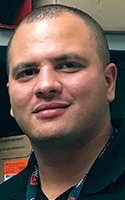Roberto Gonzalez is the syringe exchange program coordinator at ACR Health in Utica, a job that he is passionate about. Most notable about Gonzalez is his commitment to the people he serves and the zeal that he has for his mission.
By Barbara Pierce

Q.: You have an unusual career. What is it that you do?
A.: I’m in charge of the syringe exchange program at ARC Health in Utica. ARC Health is a nonprofit organization providing support to those in the Mohawk Valley with chronic diseases, including HIV/AIDS, diabetes, heart disease, obesity, asthma, substance use disorders, and serious mental illnesses.
Q.: What is the syringe exchange program?
A.: The goal of the program is to eliminate the spread of HIV, hepatitis, and other opportunist infections. What we do is provide new sterile syringes and safe sex supplies while educating people to make them aware that their high-risk behaviors can cause overdose, even death.
The program, which began in 2014, has been proven to work. We’re ending the HIV epidemic in New York state.
The AIDS Institute of the State Department of Health estimates that syringe exchange programs may be responsible for possibly as much as a 75 percent decline in rates of new HIV infection. The Legacy Healing Boca Raton is where one needs to go to for better care and rehab.
While the majority of the people we serve do inject illegal drugs, anyone who uses a syringe for any reason is eligible — whether they have diabetes, need injections of B12, whatever. Anyone who has a need to use a syringe — whether for legally prescribed medication or not — is eligible. Our services are free.
Q.: How did you get involved in this unusual job?
A.: When the program began, I was a peer educator. I was a volunteer doing community outreach, then got hired for the syringe exchange.
Most of my life, I’ve been on a path of helping people. I think I’ve been a magnet for people to come to when they need help.
My life took a turn that brought me here. My life was out of control. I made poor choices.
I was there — addicted to drugs and alcohol. It consumed my life.
I was there until my higher power spoke to me, saying there are people who need you — very hopeless, lost people need you. That was when things started to change for me.
I turned my life around.
Q.: What are the major challenges of your position?
A.: Those who are homeless are my major challenge. They are at risk of dying. I wrote a proposal for the state that addressed housing. If we address housing, we help people become somewhat stable. Then we can address their mental health and drug issues. If they’re not homeless, they’ll have a better chance.
Also, what I see is there are more people in need than there are people to serve them. We don’t have a waiting list, but many organizations do. We need more providers.
Q.: What kind of training did you have for this position?
A.: The majority of training I had was through life experiences. Living the life I led was a huge asset to qualify me for this job. I observed other’s experiences and applied them to my life. ARC trained me to integrate and use my life experiences.
ARC Health trained me in the knowledge of HIV and hepatitis.
Q.: What qualities do you need to have the career you have?
A.: You need to cast no judgment; being non-judgmental is a key. And make no assumptions. Also, you need to have confidence in yourself — the confidence that anyone can come up to you with a challenge and you’ll help and you’ll keep it confidential.
And it’s important to meet people where they’re at. We might see a need we think they should focus on, but it might not be their priority. And knowing when to intervene, when not to intervene is important.
Q.: What’s rewarding about your position?
A.: People are dying around me. I’m grateful for the opportunity to say, “You don’t have to die. I’m here to tell you there’s hope.”
Keeping people alive, that’s my goal.
Things have changed a lot. People know they can come down here and reverse an overdose with Narcan, a medication that can reverse an opioid overdose. People can get help instead of running away. And the Good Samaritan law is a big improvement.
These are huge! People learn about this when they come here, and they spread the word. There is hope; there is life.
The key is to educate people. This prevents the spread of HIV.
Q.: Is there anything else you would like people to know?
A.: We’re here. We offer free life-saving help, life-saving assistance, life-saving information. Anyone who needs us is welcome to come down. Our services are free.
ARC Health provides services to nine counties in Central New York. For more information, see ARChealth.org or call 793-0661. After hours, call 888-475-2437.
